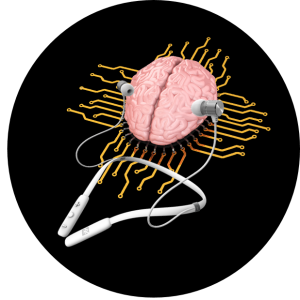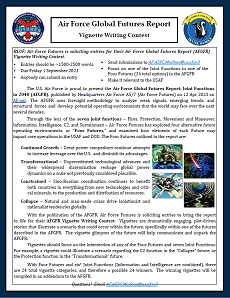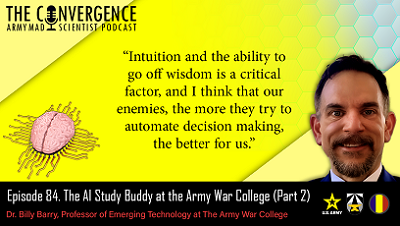“Intuition and the ability to go off wisdom is a critical factor, and I think that our enemies, the more they try to automate decision making, the better for us.”
[Editor’s Note: Regular readers of the Mad Scientist Laboratory and listeners to The Convergence podcast know that our Pacing Threat — China — is feverishly modernizing its People’s Liberation Army (PLA). In addressing the 20th National Congress of the Chinese Communist Party (CCP) on October 16, 2022, China’s President Xi Jinping stated that quickly elevating the People’s Liberation Army (PLA) to a world-class army is a strategic requirement, and that China would adhere to the integrated development of the PLA through the concept of “three-izations” (三化) — mechanization, informatization, and intelligentization — the latter being China’s concept for integrating Artificial Intelligence’s (AI’s) machine speed and processing power to military planning, operational command, and decision support. Xi further stated that these three-izations were to be pursued simultaneously and in parallel.
Consequently, it behooves us to better understand how, in the words of Dr. James Mancillas, “AI will disrupt our current military decision cycles… [and] shape the future of AI enabled military operations.” That said, understanding the limits imposed by our adversaries’ embrace of AI is just as important as appreciating how AI can help sustain and enhance our Warfighters’ overmatch — possibly allowing us to exploit the constraints wrought by an adversary’s overreliance on AI to our advantage.
Today’s episode of The Convergence podcast is the second in our The AI Study Buddy at the Army War College series, featuring Dr. Billy Barry discussing AI study technology, its impact within the Army War College, and how he sees it evolving in the future — Read on!]
[If the podcast dashboard is not rendering correctly for you, please click here to listen to the podcast.]
 Dr. Billy Barry is a Professor of Emerging Technology and Principal Strategist of the Artificial Intelligence/Intelligence Augmentation (AI/IA) Program (GovCon) for the Center for Strategic Leadership at the United States Army War College. Before working at the Army War College, Dr. Barry was a visiting professor of Philosophy and Just War Theory at the United States Military Academy at West Point. A pioneer in Human-AI/IA teams, he is the first to introduce AI-powered intelligent augmentation androids, robots, digital virtual beings, and strategic advisors as teaching and learning partners in civilian university and Professional Military Education classrooms. A sought-after TEDx and international keynote speaker, Dr. Barry’s influence extends to Fortune 500 companies and global leadership symposiums and conferences. His current research interest centers on non-invasive brain-computer interfaces, driving the conversation on ethical technology interactions. His contributions to academia and industry establish him as a leading authority on the future of human relationships with emerging technology.
Dr. Billy Barry is a Professor of Emerging Technology and Principal Strategist of the Artificial Intelligence/Intelligence Augmentation (AI/IA) Program (GovCon) for the Center for Strategic Leadership at the United States Army War College. Before working at the Army War College, Dr. Barry was a visiting professor of Philosophy and Just War Theory at the United States Military Academy at West Point. A pioneer in Human-AI/IA teams, he is the first to introduce AI-powered intelligent augmentation androids, robots, digital virtual beings, and strategic advisors as teaching and learning partners in civilian university and Professional Military Education classrooms. A sought-after TEDx and international keynote speaker, Dr. Barry’s influence extends to Fortune 500 companies and global leadership symposiums and conferences. His current research interest centers on non-invasive brain-computer interfaces, driving the conversation on ethical technology interactions. His contributions to academia and industry establish him as a leading authority on the future of human relationships with emerging technology.
Army Mad Scientist sat down with Dr. Billy Barry to discuss AI study technology, its impact within the Army War College’s curriculum at Carlisle, Pennsylvania, and how he sees it evolving in the future to enhance Professional Military Education (PME) across the Army’s Learning Enterprise. The following bullet points highlight key insights from our conversation:
-
-
 Human involvement is our advantage. Completely automated decision-making presents a number of inherent problems – narrow AI technology is not meant to replace human thought, but rather augment it. Dr. Barry explores this principle through what he calls an AI-powered cognitive asset that partners an intelligence augmentation (IA) system with a human student.
Human involvement is our advantage. Completely automated decision-making presents a number of inherent problems – narrow AI technology is not meant to replace human thought, but rather augment it. Dr. Barry explores this principle through what he calls an AI-powered cognitive asset that partners an intelligence augmentation (IA) system with a human student.
-
-
-
- We tend to think about artificial intelligence as a tool, but Dr. Barry sees AI as a partner — since 2017, he’s never taught a class without an
 IA/AI entity co-teaching with him. The students are free to ask the entity questions independent of Dr. Barry’s instruction, and Dr. Barry can ask the entity for help on subjects with which he is less familiar.
IA/AI entity co-teaching with him. The students are free to ask the entity questions independent of Dr. Barry’s instruction, and Dr. Barry can ask the entity for help on subjects with which he is less familiar.
- We tend to think about artificial intelligence as a tool, but Dr. Barry sees AI as a partner — since 2017, he’s never taught a class without an
-
-
-
- Dr. Barry’s research originated as a project to capture institutional
 knowledge from contemporary Senior Military Leaders. By interacting with the system, a digital “thought twin” can be created that is a reasonable facsimile of the original individual. It will represent their thoughts and expertise and can interact with users, students, and educators to preserve and replicate institutional knowledge that would otherwise perish with the retirement and subsequent demise of these Leaders.
knowledge from contemporary Senior Military Leaders. By interacting with the system, a digital “thought twin” can be created that is a reasonable facsimile of the original individual. It will represent their thoughts and expertise and can interact with users, students, and educators to preserve and replicate institutional knowledge that would otherwise perish with the retirement and subsequent demise of these Leaders.
- Dr. Barry’s research originated as a project to capture institutional
-
-
-
- Recently, the Chief Digital and Artificial Intelligence Office (CDAO) within the DoD created Task Force Lima to analyze and integrate generative AI tools such as large language models (LLMs) across the
 DoD. This is the first step in combining technical expertise and novel use cases to help build better, integrated capability across the DoD as opposed to duplicative, disjoined, and redundant efforts across the Services.
DoD. This is the first step in combining technical expertise and novel use cases to help build better, integrated capability across the DoD as opposed to duplicative, disjoined, and redundant efforts across the Services.
- Recently, the Chief Digital and Artificial Intelligence Office (CDAO) within the DoD created Task Force Lima to analyze and integrate generative AI tools such as large language models (LLMs) across the
-
-
-
- AI and LLMs are democratized technologies, available to allies and adversaries alike. While we will use IA/AI assets as decision advisors, other
 autocratic countries, like China, may require strict adherence to guidance received from these automated systems, relying less on the human who can add context and nuance and instead taking the computer’s answer as a verbatim certainty. Understanding this could enable our Warfighters to “game” our adversaries’ automated OODA loop, allowing us to spoof or “poison” the data flowing into their sensors’ feeds and thus shape their responses to our tactical, operational, and strategic advantage.
autocratic countries, like China, may require strict adherence to guidance received from these automated systems, relying less on the human who can add context and nuance and instead taking the computer’s answer as a verbatim certainty. Understanding this could enable our Warfighters to “game” our adversaries’ automated OODA loop, allowing us to spoof or “poison” the data flowing into their sensors’ feeds and thus shape their responses to our tactical, operational, and strategic advantage.
- AI and LLMs are democratized technologies, available to allies and adversaries alike. While we will use IA/AI assets as decision advisors, other
-
-
-
- Education is now a national security issue. Automation within education will have a positive impact on many administrative tasks and
 can produce enough quality material to pass most classes. Educators will now have to adapt to ensure their students’ coursework contains enough distinction and nuance to perplex AI systems, but not human students.
can produce enough quality material to pass most classes. Educators will now have to adapt to ensure their students’ coursework contains enough distinction and nuance to perplex AI systems, but not human students.
- Education is now a national security issue. Automation within education will have a positive impact on many administrative tasks and
-

Stay tuned to the Mad Scientist Laboratory for our next episode of The Convergence podcast on 14 September 2023, featuring our discussion with Loran Ambs, Chief Technology Officer for Ideal Innovations, Inc., about his company’s research in measuring the distinctive characteristics of innate talent, identifying potential high performers, and how the Army can harness AI/ML to screen and match these high performers with specialty vocations (e.g., pilots, special operators, and other select duty positions).
If you enjoyed this post, check out the China Landing Zone content on the TRADOC G-2‘s Operational Environment Enterprise public facing page — including the BiteSize China weekly topics, ATP 7-100.3, Chinese Tactics, People’s Liberation Army Ground Forces Quick Reference Guide, and more!
… and explore the following related Army Mad Scientist content:
China’s PLA Modernization through the DOTMLPF-P Lens, by Dr. Jacob Barton
“Intelligentization” and a Chinese Vision of Future War
How China Fights and associated podcast, with seven world-class SMEs
The AI Study Buddy at the Army War College (Part 1) and associated podcast, with LtCol Joe Buffamante, USMC
Hey, ChatGPT, Help Me Win this Contract! and associated podcast, with LTC Robert Solano
Chatty Cathy, Open the Pod Bay Doors: An Interview with ChatGPT and associated podcast
One Brain Chip, Please! Neuro-AI with two of the Maddest Scientists and associated podcast, with proclaimed Mad Scientists Dr. James Giordano and Dr. James Canton
Where Creativity Meets Combat: Exploring the USC ICT and associated podcast, with Dr. Keith Brawner and Dr. Bill Swartout
The Future of Learning: Personalized, Continuous, and Accelerated
Arsenal of the Mind presentation by proclaimed Mad Scientist Juliane Gallina, Director, Cognitive Solutions for National Security (North America) IBM WATSON, at the Mad Scientist Robotics, AI, and Autonomy — Visioning Multi-Domain Battle in 2030-2050 Conference, hosted by Georgia Tech Research Institute, Atlanta Georgia, 7-8 March 2017
Artificial Intelligence: An Emerging Game-changer
Takeaways Learned about the Future of the AI Battlefield and associated information paper
The Guy Behind the Guy: AI as the Indispensable Marshal, by Brady Moore and Chris Sauceda
Integrating Artificial Intelligence into Military Operations, by Dr. James Mancillas
Prediction Machines: The Simple Economics of Artificial Intelligence
“Own the Night” and the associated Modern War Institute podcast, with proclaimed Mad Scientist Bob Work
Bringing AI to the Joint Force and associated podcast, with Jacqueline Tame, Alka Patel, and Dr. Jane Pinelis
AI Enhancing EI in War, by MAJ Vincent Dueñas
The Human Targeting Solution: An AI Story, by CW3 Jesse R. Crifasi
An Appropriate Level of Trust…
AFGFR Vignette Writing Contest: >>>>DEADLINE FOR SUBMISSION IS TOMORROW, 01SEP23<<<< Our Sister Service partners in the U.S. Air Force (USAF) are proud to present the Air Force Global Futures Report: Joint Functions in 2040, published by Headquarters Air Force A5/7 (aka Air Force Futures). This report is the USAF’s analogue to the U.S. Army Futures Command’s AFC Pamphlet 525-2, Future Operational Environment: Forging the Future in an Uncertain World 2035-2050.
The AFGFR highlights four future operating environments and major implications for the future force. To bring these operating environments to life, Army Mad Scientist is partnering with the Air Force Futures’ Foresight Team to conduct the AFGFR Vignette Writing Contest — based on the report’s four futures and the exploration of the Joint Functions. We are seeking vignettes with characters that make the future operating environments and associated  Joint Functions within come to life!
Joint Functions within come to life!
The AFGFR Vignette Writing Contest is open to all — anyone can submit an entry. Entries should be between 1500-2500 words in length, and are due NLT 01 September 2023 — TOMMORROW!!! To learn more about the contest and how to submit your entry(ies), click >>>> here <<<< and read the contest flyer!
Disclaimer: The views expressed in this blog post do not necessarily reflect those of the U.S. Department of Defense, Department of the Army, Army Futures Command (AFC), or Training and Doctrine Command (TRADOC).



